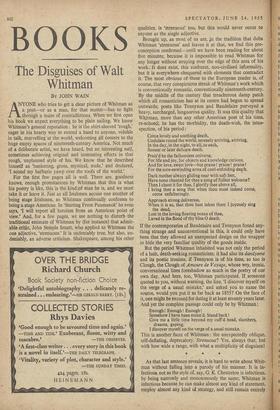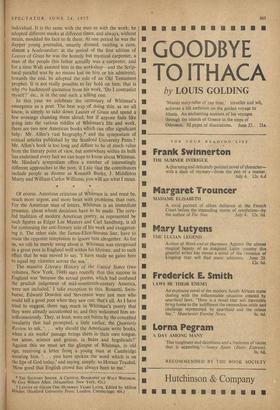The Disguises of Walt Whitman
BY JOHN WAIN ANYONE who tries to get a clear picture of Whitman as a poet—or as a man, for that matter—has to fight through a maze of contradictions. When we first open his book we expect everything to be plain sailing. We know Whitman's general reputation : he is the shirt-sleeved 'rough,' eager in his hearty way to extend a hand to anyone, voluble in talk, marvelling at the world, welcoming all comers to the huge empty spaces of nineteenth-century America. Not much of a deliberate artist, we have heard, but an interesting na'if, sometimes achieving original and interesting effects in that rough, unplanned style of his. We know that he described himself as 'hankering, gross, mystical, nude,' and declared, 'I sound my barbaric yawp over the roofs of the world.'
For the first few pages all is well. There are, goodness knows, enough protestations by Whitman that this is what his poetry is like, this is the kind of man he is, and we must take it or leave it. JUst as all Irishmen accuse one another of being stage Irishmen, so Whitman continually confesses to being a stage American. In 'Starting From Paumanok' he even says, 'I will report all heroism from an American point of view.' And, for a few pages, we see nothing to disturb the traditional estimate of Whitman by (for instance) that admir- able critic, John Semple Smart, who applied to Whitman the one adjective, 'strenuous.' It is undeniably true, but also, un- deniably, an adverse criticism. Shakespeare, among his other qualities, is 'strenuous' too, but this would never occur to anyone as the single adjective.
Brought up, as most of us are, n the tradition that dubs Whitman 'strenuous' and leaves it at that, we find this pre- conception confirmed—until we have been reading for about five minutes; because it is impossible to read Whitman for any longer without straying over the edge of this area of his work. It does exist, this sunburnt, non-civilised informality, but it is everywhere chequered with elements that contradict it. The most obvious of these to the European teader is, of course, that very conspicuous streak of Whitman's work which is conventionally romantic, conventionally nineteenth-century. By the middle of the century that treacherous damp patch which all romanticism has at its centre had begun to spread outwards; poets like Tennyson and Baudelaire purveyed a heavy, surcharged, languorous quality. It was this quality that Whitman, more than any other American poet of his time, re-echoed; he has the morbidity, the death-wish, the intro- spection, of his period :
Come lovely and soothing death, Undulate round the world, serenely arriving, arriving, In the day, in the night, to all, to each, Sooner or later delicate death.
Prais'd be the fathomless universe, For life and joy, for objects and knowledge curious, And for love, sweet love—but praise! praise ! praise! For the sure-enwinding arms of cool-enfolding death.
Dark mother always gliding near with soft feet, Have none chanted for thee a song of fullest welcome? Then I chant it for thee, I glorify thee above all, I bring thee a song that when thou must indeed come, come unfalteringly.
Approach strong cleliveress,
When it is so, that thou hast taken them I joyously sing
the dead, Lost in the loving floating ocean of thee,
Laved in the flood of thy bliss 0 death.
If the contemporaries of Baudelaire and Tennyson found any- thing strange and unconventional in this, it could only have been that they allowed an unexpected design on the wrapper :o hide the very familiar quality of the goods inside.
But the period Whitman inhabited was not only the period of a lush, death-seeking romanticism; it had also its dandysvne and its poetic ironists; if Tennyson is of his time,' so too is Clough, the Clough of Amours de Voyage, whose wry, ironic, conversational lines foreshadow so much in the poetry of our own day. And here, too, Whitman participated. If , someone quoted to you, without warning, the line, 'I discover myself on the verge of a usual mistake,' and asked you to name the source, would you put it as far back as 1855? On the face of it, one might be excused for dating it at least seventy years later. And yet the complete passage could only be by Whitman:
Enough! Enough! Enough !
Somehow I have been stunn'd. Stand back!
Give me a little time beyond my cuff'd head, slumbers,
dreams, gaping, I discover myself on the verge of a usual mistake.
This is another facet of Whitman : the unexpectedly oblique, self-deflating, deprecatory. Strenuous? Yes, always that; but with how wide a range, with what a multiplicity of disguises!
As that last sentence reveals, it is hard to write about Whit- man without falling into a parody of his manner. It is in- fectious, not as the style of, say, G. K. Chesterton is infectious. by being narrowly and monotonously the same; Whitman is infectious because he can make almost any kind of statement, employ almost any kind of strategy, and still remain entirely individual. It is the same with the man as with the work; he adopted different masks at different times, and always, without strain, moulded his face to fit them. At one period he was the dapper young journalist, smartly dressed. twirling a cane. almost a boulevardier; at the period of the first edition of Leaves of Grass he was the homely but mystical carpenter, a man of the people (his father actually was a carpenter, and for a time Walt assisted him in the workshop—and the Scrip- tural parallel was by no means lost on him or his admirers); towards the end, he adopted the role of an Old Testament prophet. It is not really possible to lay hold on him; that is why the hackneyed quotation from his work, 'Do I contradict myself?' etc., is in the end such a telling one.
In this year we celebrate the centenary of Whitman's emergence as a poet. The best way of doing this, as we all know, is simply to take down Leaves of Grass and spend a few evenings chanting them aloud; but if anyone feels like going into the various riddles of Whitman's life and work, there are two new American books which can offer significant help : Mr. Allen's vast biography,* and the symposium of critical articles published by the Stanford University Press.'t Mr. Allen's book is too long and diffuse to be of much value from the literary point of view, but somewhere within its bulk lies enshrined every fact we can hope to know about Whitman. Mr. Hindus's symposium offers a number of interestingly different approaches to the poet; if I say that the contributors include people as diverse as Kenneth Burke. J. Middleton Murry and William Carlos Williams, you will see what I mean.
Of course. American criticism of Whitman is, and must be, much more urgent, and more beset with problems, than ours. For the American man of letters, Whitman is an immediate presence, about whom decisions have to be made. The corn- fed tradition of modern American poetry, as represented by such figures as Edgar Lee Masters and Carl Sandburg, is all for continuing the anti-literary side of his work and exaggerat- ing it. The other side, the James-Eliot-Stevens line, have to resist the opposite temptation to ignore him altogether. As for us, we calf be merely smug about it. Whitman was recognised as a great poet in England well within his lifetime, and to such effect that he was moved to say, 'I have made no gains here to equal my victories across the sea.'
The massive Literary History of the United States (two volumes, New York, 1948) says roundly that this success in England was 'because the sexual poems. which had confused the prudish judgement of mid-nineteenth-century America, were not included.' I take exception to this. Rossetti, Swin- burne, Edward Dowden and Stevenson were just men who could tell a good poet when they saw one, that's all. As I have tried to suggest, there wig, much in Whitman's poetry that they were already accustomed to, and they welcomed him un- selfconsciously. They, at least, were not bitten by the conceited insularity that had prompted, a little earlier, the Quarterly Review to ask, . . why should the Americans write books, when a six weeks' passage brings them in their own tongue, our sense, science and genius, in bales and hogsheads?' Against this we must set the glimpse of Whitman, in old age, receiving a letter from a young man at Cambridge assuring him, . . you have spoken the word which is on the lips of God today,' and saying, simply, to Horace Traubel. 'How good that English crowd has always been to me.'


















































 Previous page
Previous page